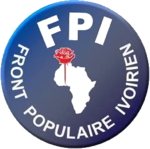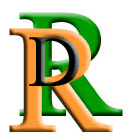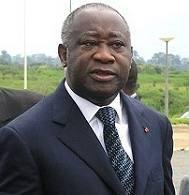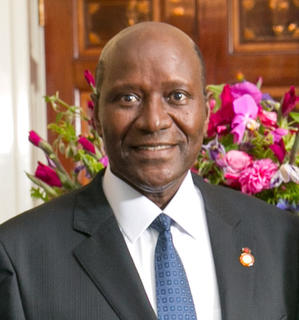| |||||||||||||||||
| |||||||||||||||||
| |||||||||||||||||
 |
|---|
| This article is part of a series on the politics and government of Ivory Coast |
|
Presidential elections were held in Ivory Coast on 22 October 1995. They were boycotted by the main opposition parties, the Ivorian Popular Front and the Rally of the Republicans, in protest of new electoral rules that the opposition deemed unfair. Presidential candidates were required to have been born of two Ivorian parents, and to have been resident in the country for the previous five years. These provisions appeared to have been aimed at the RDR's intended candidate, former Prime Minister Alassane Ouattara. He had been in the United States since 1990 while working for the International Monetary Fund, and there had been longstanding rumors that his father had been born in Burkina Faso.

The Ivorian Popular Front is a centre-left, democratic socialist and social democratic political party in Ivory Coast.

The Rally of the Republicans is a liberal party in Ivory Coast. The party is the country's governing party; the party's leader, Alassane Ouattara, is the current President of Ivory Coast.

Alassane Dramane Ouattara is an Ivorian politician who has been President of Ivory Coast since 2010. An economist by profession, Ouattara worked for the International Monetary Fund (IMF) and the Central Bank of West African States, and he was the Prime Minister of Côte d'Ivoire from November 1990 to December 1993, appointed to that post by President Félix Houphouët-Boigny. Ouattara became the President of the Rally of the Republicans (RDR), an Ivorian political party, in 1999.
Incumbent Henri Konan Bédié thus faced only one opponent, Francis Wodié of the tiny Ivorian Workers Party. As President of the National Assembly, Bédié had served as interim president since the death of the country's founding leader, Félix Houphouët-Boigny, in 1993. Bédié was re-elected with 96.44% of the vote, with a turnout of 56.2%. [1]
Aimé Henri Konan Bédié is an Ivorian politician. He was President of Côte d'Ivoire from 1993 to 1999, and he is currently the President of the Democratic Party of Côte d'Ivoire - African Democratic Rally (PDCI-RDA).

Romain Francis Wodié is an Ivorian politician. A professor and human rights activist, he led the Ivorian Workers' Party (PIT) from 1990 to 2011. During that time, Wodié served as a Deputy in the National Assembly of Côte d'Ivoire from 1990 to 1995 and as Minister of Higher Education from 1998 to 1999. He was President of the Constitutional Council of Côte d'Ivoire from 2011 to 2015.

Félix Houphouët-Boigny, affectionately called Papa Houphouët or Le Vieux, was the first President of Ivory Coast, serving for more than three decades until his death. A tribal chief, he worked as a medical aide, union leader, and planter before being elected to the French Parliament. He served in several ministerial positions within the French government before leading Côte d'Ivoire following independence in 1960. Throughout his life, he played a significant role in politics and the decolonization of Africa.







